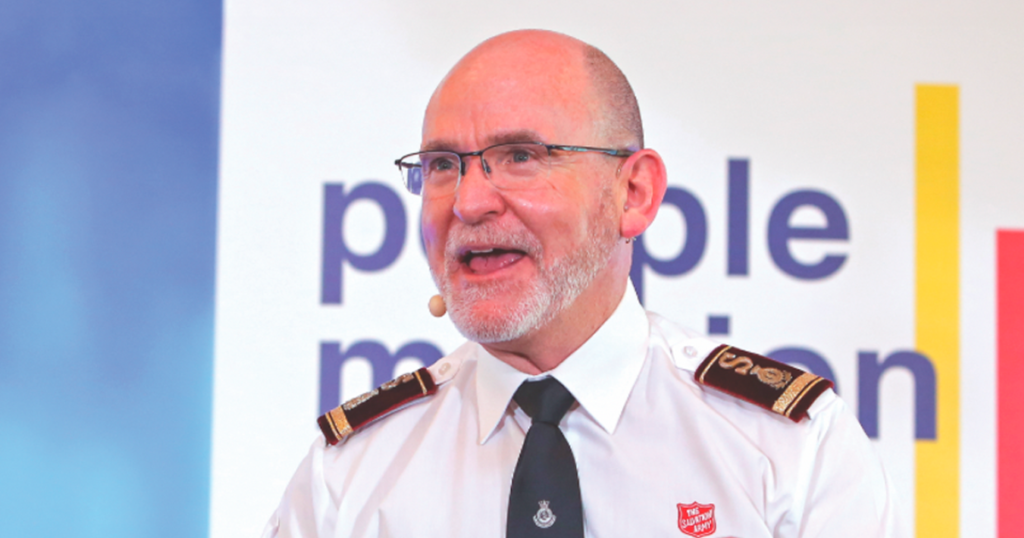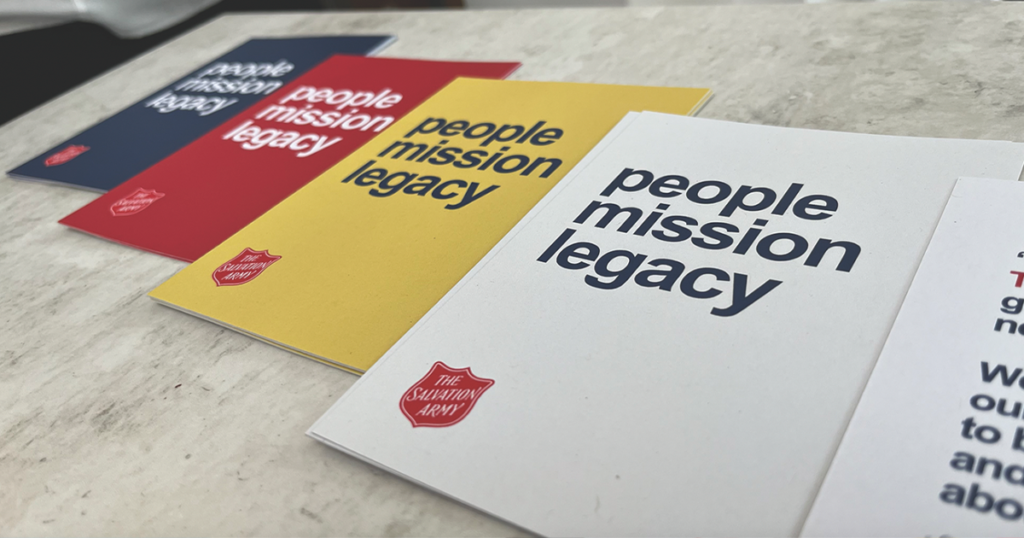Navigating With Compass
Imagine every Salvationist around the Army globe really clear about what it means to be a person who belongs to God.
In January, Dale Bannon (DB), National Community Relations and Development Secretary, interviewed General Lyndon Buckingham (LB), international leader of The Salvation Army, for the Board Matters podcast. The General attended the National Advisory Board meeting in Las Vegas and sat down to talk about his background, experiences as General, and the Compass Global Strategic Framework.
DB: You are the first General from New Zealand. For our listeners who don’t know your story, I think I’d just like to start there. Tell us about your background, your family, and how you got from being an officer in New Zealand to the General of the Salvation Army.
LB: I had officer parents and was raised in the Salvation Army. The Salvation Army came to New Zealand in 1883. And my great-great-grandfather and his son went to a Salvation Army meeting in 1886, and they both got wonderfully saved. Our family has been a part of the movement ever since. So, it’s a beautiful thing. I had officer parents, [I was]raised within the Army, and we’ve celebrated just this week on the 20th of January 35 years as officers in The Salvation Army. So, how we got from our early days to becoming international leaders was a willingness to make ourselves available to the Lord and to the movement. Part of our officership covenant was a kind of commitment of availability and just a willingness to say yes to the opportunities and to the appointments that we’ve been given, and here we are. I can’t believe, to be honest with you, that it’s been 35 years.
DB: In the last year and a half, what has it been like to serve as the international leader of the Salvation Army?
LB: It’s a humbling experience. We’re overwhelmed. I would use two words. I would use the words privilege and burden, and it’s a combination of privilege and burden almost every day. We are finding reasons to give thanks to the Lord for the opportunities that are presented to us in these roles. But we also find ourselves in the presence of the King, seeking wisdom and grace and courage for the burden that is the reality of the movement that’s currently serving in 134 countries around the world and in some pretty interesting scenarios. So, I would say for me it’s a combination of privilege and burden.
And the Lord is gracious and good to us, and, we feel, there’s no other way to describe this, but we feel that we are being carried along by the prayers of faithful Salvationists, and we’re feeling it spiritually, we’re feeling it physically, and we’re feeling it emotionally, that there is a dynamic of the Spirit going on through the prayers of people around the world that we feel are carrying us. That’s a beautiful thing. I have so many people writing to us. They’ll come up to us at an event and say, “I just want you to know, General, I pray for you every day.” What a beautiful thing. It’s so humbling.
DB: Could you just share with our listeners a bit about what the Compass Global Strategic Framework is and what motivated its creation?
LB: The genesis of Compass really was the 2022 International Leaders Conference. I was serving as the Chief of the Staff then, and I asked General Brian Peddle, and I give him credit for this, to allow us a couple of days at that conference to start pushing the international leaders that were gathered from around the world, asking “What is the Spirit saying to you? What’s on your heart? What’s on your mind? What are you seeing as being critical issues for The Salvation Army that we need to make an incoming administration aware of?” And we knew that in the May of the next year there would be the High Council, and so, we spent two days in prayer and conversation and discussion, coming up with goals and issues.
To be honest with you, I was a bit naive, but I was hoping that we might come up with two or three goals. And I think the first round produced about 27, and we narrowed it down over a couple of days to maybe 21 concerns or issues. They became part of the questions and the conversations at the High Council in 2023, and, subsequently, when I came into office in August of that year, they were on my desk actually in an envelope addressed to the new General with a cover letter that I had written as the Chief of the Staff, not knowing that I was essentially writing to myself, outlining the work that had been done up to this point.
And so, in the successive General’s Consultative Councils, we refined this. And in that conversation, it emerged that we were talking about a framework rather than a global strategic plan. I think this was beautiful. I think we were guided in this way by the Spirit because many territories had already developed their own strategic plans. Many territories were in the process of developing a strategic plan, and whilst we’re one Army, there are so many different contexts that leaders are trying to respond to that require a nuanced plan so that Indonesia’s plan is going to look different from USA West’s plan. So, a global plan over the top of that? Pretty hard. What emerged was this idea of a framework that said, basically, territories, you develop your plans, but let’s agree globally. Let’s agree that the Army globally is going to focus on particular areas of ministry to ensure that we advance the work.
And so, Compass focuses on people, mission and legacy. People — it focuses on our own people: their development, their empowerment, their health, their well-being, their clarity around our mission. What that looks like in Indonesia might be different from USA West, but they are looking at their people too. Our own people. Not the people we’re trying to serve in this instance, but our own people’s readiness.

DB: Readiness to serve.
LB: Readiness to embrace and fulfill the missional mandate of the movement. So, you imagine every Salvationist around the Army globe really clear about what it means to be a person who belongs to God on the planet, expressing that belonging through The Salvation Army. What does that look like? Our people investing in discipleship programs and education, in innovation and creativity, having a go at being the people of God on the planet. That’s the framework: people. In terms of the mission, in the framework we talk about enhancing our mission impact and again, the reason you can’t have an international strategy is because we require different things in different contexts.
I’m worried about mission drift, the potential for mission drift. It’s something that a movement like ours that’s celebrating 160 years of life this year needs to be conscious of, because mission drift is subtle. And often good things lead you into missional drift, and by mission drift, I mean moving away from those things and from that work that the Lord raised you up to be and to do in the first place, right?
And so, I’m asking territories to have a look at their programs, a look at where they’re investing resources, a look at what they’re saying yes to. What are you signing up for, and is it true to who God raised us up to be as a people and what he asked us to do on the planet? If it is, great, and if it isn’t then …?
DB: They should adjust and say no?
LB: Come on team, let’s have some courage. Let’s say, you know, this is good but it’s not for us and it’s better for us as a movement to be excelling in six things than failing in twelve. So that whole mission space is about making sure that we are as impactful as we have the potential to be because we’re clear about our mission, we understand our space, we understand what it is that God’s raised us up to do.
The legacy space is this. It’s not legacy in terms of what’s gone on in the past. It’s what we’re doing now. It’s how we’re investing now as the people of God on the planet, and I think the movement needs to embrace the legacy question: Where are we putting our resources? Where are we spending our money? What hard decisions do we know we need to make as a movement that we’re reluctant to make or that we’ve been kicking the can down the road over several years, but we know that actually we need to do something? And I’m calling for us as an Army to say, let’s have the courage to not leave a legacy for the emerging generation of all those tough decisions we’ve been reluctant to make during our tenure.
So, the framework is really asking territories to have a conversation, and the thing I love about the framework is you can ask it at every level of ministry, from international headquarters to the local corps.
To watch or listen to the full interview, click here.
Photos courtesy of The Salvation Army International Headquarters







